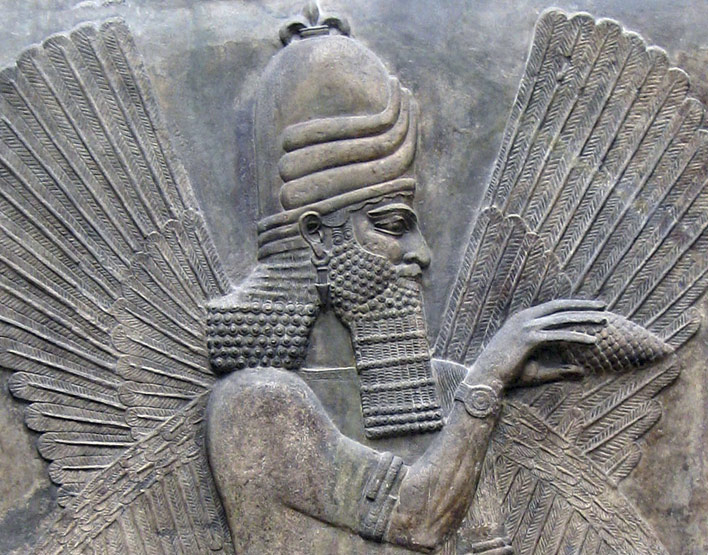
Common Heritage: Genesis and Enûma Elišh Comparison
Many of the most common religious stories and traditions appear to trace their roots to a common heritage of ancient oral traditions.
Today most scholars agree that although there are significant differences, there are enough similarities to indicate that the creation story in the biblical Genesis draws upon a common cultural legacy also documented in the tablets of Enûma Elišh, which were originally written down at least as early as 2,000 BCE from an oral tradition that was very much older. Cross-cultural assimilations between Jewish and Zoroastrian ideas are also evident in the concept of a Messiah, the resurrection of the dead, and life everlasting.
| Genesis | Enûma Elišh | |
| Initial state of the earth | “A formless void and darkness covered the face of the deep.” (Gen 1:1-2) | “When in the height heaven was not named, And the earth beneath did not yet bear a name, And the primeval Apsû (freshwater sea), who begat them, And chaos, Tiamat (saltwater sea), the mother of them both,—Their waters were mingled together…” (Tablet 1) |
| First development | God creates light (“Let there be light!”).The light is divided from the darkness. (Gen 1:3-4) | “When of the gods none had been called into being, And none bore a name, and no destinies [were ordained]; Then were created the gods in the midst of [heaven]…” (Tablet 1) “Marduk “the mighty one,” “the Light of the father who begat him…” (Tablet 7) |
| Second development | God creates firmament—the sky.The waters above are divided from the waters below. (Gen 1:6-7) | Marduk conquers Tiamat, splits her in half and establishes “the sky” or “above” and “earth” or “below”. (Tablet 4) |
| Third development | God commands the waters below to be gathered together in one place, and dry land to appear. God commands the earth to bring forth grass, plants, and fruit-bearing trees. (Gen 1:9-12) | “He fixed a bolt, he stationed a watchman, And bade them not to let her waters come forth…” (Tablet 4)“O Asari, [Marduk] “Bestower of planting,” “Founder of sowing,” “Creator of grain and plants,” “who caused the green herb to spring up!” (Tablet 7) |
| Fourth development | God creates lights in the firmament to separate light from darkness. Two great lights are created, as well as the stars. (Gen 1:14-15) | “He (Marduk) made the stations for the great gods; The stars, their images, as the stars of the Zodiac, he fixed. He ordained the year and into sections he divided it; For the twelve months he fixed three stars…” (Tablet 5) |
| Fifth development | God commands the sea to “teem with living creatures,” and birds to fly across the heavens. He creates birds and sea creatures, and commands them to be fruitful and multiply. (Gen 1:20-21) | “Tutu as Aga-azag may mankind fourthly magnify!” (Tablet 7) |
| Sixth development | And God said, “Let the land produce living creatures according to their kinds.” (Gen 1:24-25). He then creates mankind in His image and likeness. They are told to “be fruitful, and multiply, and fill the earth, and subdue it. ” Humans and animals are given plants to eat. (Gen 1:26-30). | “My blood will I take and bone will I fashion; I will make man, that man may… I will create man who shall inhabit the earth…” (Tablet 6) |
| Seventh development | God, having completed the heavens and the earth, rests from His work, and blesses and sanctifies the seventh day. (Gen 2:1-3). | “Then the lord rested, gazing upon her dead body…” (Tablet 4) “They seated themselves and in the assembly they named him…, They all cried aloud, they exalted him…” (Tablet 6) |
The names of the central primordial beings, gods and the elements associated with them in the Enûma Elišh:
- Tiamat (saltwater sea) and Apsu (freshwater sea)
- Lahmu and Lahamu. (male and female, translated variously as “silt” or “hairy”)
- Anshar and Kishar. (“above and below” or the twin horizons of sky and earth respectively)
- Anu (“Sky-god” or “Heaven”)
- Bel (“Lord of the World,” “The Earth”)
- Ea, sometimes Nudimmud. (“God of the waters” or “King of the deep”)
- Mummu (“Craftsman god”)
- Kingu (“unskilled laborer”)
- Marduk (“Sun-Calf” and “God of light or lightning”)
